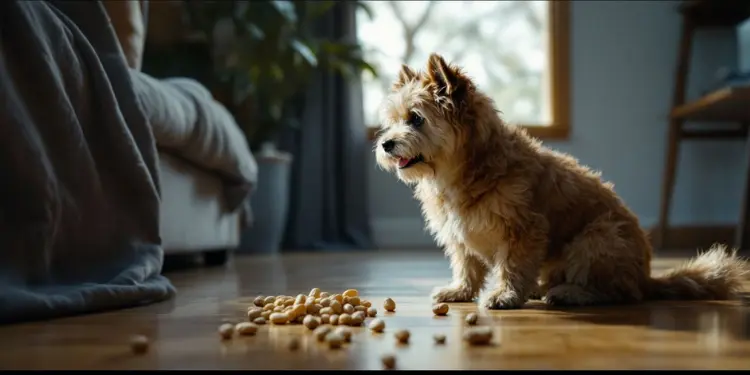Ever wonder “do dogs eat peanuts” when your pup gives you those pleading eyes as you snack? Many dog owners worry about sharing human foods with their pets. Peanuts are safe when given properly, yet they carry risks like choking hazards and high fat content.
This guide shows you which peanuts are safe, how much to serve, and when to avoid them.

Can Dogs Eat Peanuts?

Yes, dogs can eat peanuts, but careful thought is needed. Plain, unsalted peanuts stand as the best option for your pet. They supply protein along with vitamin B-6 and vitamin E, which add to strong dog health.
You can also offer homemade peanut butter as an occasional treat if it uses dog-safe ingredients without extra salt or sugar. This keeps treats both tasty and safe.
Although peanut allergies in dogs show up rarely—with only one documented case—you should watch for symptoms like vomiting, itching, swelling, or breathing troubles. Should these signs appear, contact your vet immediately for proper veterinary advice.
How to Safely Introduce Peanuts to Your Dog’s Diet
Start slow. Mix a few plain, dry-roasted peanuts into your dog’s regular meal. This method lets you spot any adverse reaction quickly. If your dog enjoys the taste without issue, you might give them occasional peanuts as a fun dog treat.
What Types of Peanuts Are Safe for Dogs?
Dogs can enjoy several types of peanuts as tasty treats. Below is a list of safe options and those to avoid:
- Plain, dry-roasted peanuts without shells are the top dog-safe choice. They lower the risk of choking hazards.
- Raw, shelled peanuts can be given in small amounts. Make sure they are fresh and free from mold.
- Homemade peanut butter with no added salt or sugar makes a great treat. Many pups appreciate a small spoonful.
- Unsalted peanuts boost dog nutrition better than their salted counterparts. Too much salt might upset your pet.
- Avoid honey-roasted peanuts because the sugar coating is not good for teeth or the waistline.
- Never serve peanuts with shells since they can cause a choking hazard and digestive discomfort.
- Skip boiled peanuts due to their high salt content and soft texture.
- Avoid any peanut products with xylitol, a sugar stand-in that is toxic to dogs. Always read labels carefully.
- Chocolate-covered peanuts must not be given because chocolate harms dogs even in small amounts.
- Seasoned or flavored peanuts often contain spices or garlic that can upset your dog’s stomach.
Online video links in this guide support these tips. They help explain why plain, unsalted peanuts and proper portion control matter. Verified sources such as akc.org back up these standards in dog nutrition.
Risks of Feeding Peanuts to Dogs
Peanuts can pose serious dangers if not served properly. Unshelled peanuts may get stuck in your dog’s throat, causing a real choking hazard. Their high fat content can lead to weight gain and even pancreatitis, a painful condition.
Raw peanuts might contain harmful aflatoxins that can damage the liver. Watch for signs like loss of appetite, vomiting, lethargy, or tummy pain. If these occur, contact your vet without delay.
Excess salt from commercial peanuts may cause dehydration or, in severe cases, salt poisoning in smaller dogs. Flavored options like honey-roasted peanuts have extra sugar and spices that upset dog digestion.
Some peanut butter for dogs carries xylitol, a toxic ingredient even in minuscule doses. Always read the label with care and limit treats to prevent issues such as overweight dogs.
Conclusion
Feeding peanuts to your dog is safe when you follow a few simple rules. Stick with plain, unsalted peanuts and keep an eye on portion control for dogs. This helps avoid weight gain and digestive issues. Consult your veterinarian if your pet has special dietary needs or health concerns.
For more information on what other human foods are safe for your pets, check out our guide on whether dogs can eat tuna.
About the Author: This guide was reviewed by a team of pet nutrition experts at DoDogsEat.com. Our group is made up of experienced dog owners and pet care writers who value clear, reliable dog nutrition advice.
We base our article on data from veterinary studies and tips from trusted sources such as akc.org.
Disclosure: The research for this guide involved gathering insights from vetted veterinary advice and authoritative studies. Our aim is to offer helpful, clear information that supports dog health. This content is for informational purposes only and should not replace professional veterinary advice.







